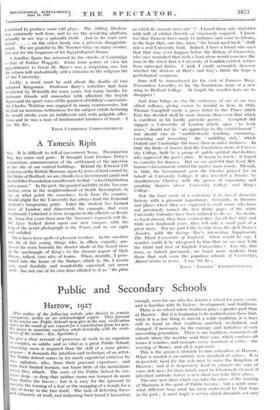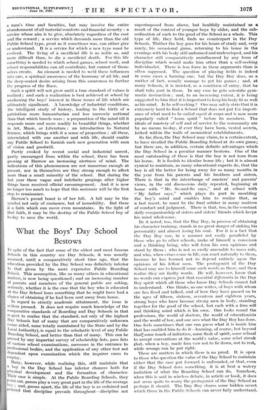Public and Secondary Schools
Harrow, 1927
(The author of the following article, who desires to remain goonymus, writes as an acknowledged expert. This forecast of the service our Public Schools may give to the new civilization comes as the result of our request for a contribution from his pen. We desire to associate ourselves whole-heartedly with the senti- ments of the writer.—ED. Spectator.) To give a clear account of processes at work in an organism so complex, so subtle, and so vital as a great Public School, something more is required than the skill of a mere photo- grapher ; it demands the intuition and technique of an artist. The Public School comes in for much superficial criticism by class agitators, who, from their personal experience, and with their limited horizon, can know little of the institutions which they attack. The roots of the Public School lie cen- turies deep--so deep that neither storm nor tempest do more than flutter the leaves ; but it is easy for the ignorant to mistake the turning of a leaf or the snapping of a bough for a sign of decay in the tree itself. The task of detecting forces influences nfluences at work, and indicating their trend is hazardous
enough, even for one who has known a school for many years, • and is familiar with its history, development, and traditions.
There is no school where tradition plays a greater part than at Harrow. But it is beginning to be realized even there that, while it is a fine thing to inherit a noble tradition, it is finer still to hand on that tradition enriched, revitalized, and changed, if necessary, by the courage and initiative of cacti succeeding generation. There is one tradition, common to all schools where the wealthy send their sons. which confuses all issues it touches, and corrupts every standard of values-- the worship of Money, and all it represents.
This is the greatest obstacle to true education at Harrow. What is needed is an entirely new standard of values. It is desperately hard for the rich man to enter the Kingdom of Heaven ; and it is desperately hard to educate the sons of some rich men, for their minds must be laboriously cleared of inherited outlooks before a new ideal can take their place.
The only new ideal which can take the place of the worship of Mammon is the spirit of Public Service : but a spirit some- what different from what has been understood by that term in the past ; it must imply a service which demands not only
a man's time and faculties, but may involve the entire abandonment of all material comforts and financial security : a service whose aim is to give, absolutely regardless of the cost and the reward ; a service which demands more than the old Public School type, great as it sometimes was,-can either give or understand. It is a service for which a new type must be evolved. The living of a sacrificial life is as noble as, and more difficult than, to die a sacrificial death. For this life something is needed to which school games, school work, and school responsibilities can all contribute, but cannot of them- selves create. An element is needed to weld these influences into one, a spiritual awareness of the harmony of all life, and the deep-seated desire arising from this awareness to further the progress of the Race.
Such a spirit will not grow until a true standard of values is realized ; and such a realization is best achieved at school by awakening the boys' interest in those issues of life which are ultimately significant. A knowledge of industrial conditions, the intelligent study of history, leading to the birth of a patriotism more humanitarian and less narrowly national than that which breeds wars ; a preparation of the mind till it responds more and more readily to beautiful things, whether in Art, Music, or Literature ; an introduction to Natural Science, which brings with it a sense of proportion ; all these, interrelated with one another and with life, should enable any Public School to furnish each new generation with men of vision and goodwill.
Partly evoked by recent social and industrial unrest, partly encouraged from within the school, there has been growing at Harrow an increasing alertness of mind. The indications of this phenomenon are not numerous enough at present, nor in themselves are they strong enough to affect more than a small minority of the school. But during the last year these vague and indefinite gropings after higher things have received official encouragement. And it is now no longer too much to hope that this metanoia will be the first step to renaissance.
Harrow's proud boast is of her hill. A hill may be the symbol not only of eminence, but of immobility. But there is a faith which can move even mountains. In the light of that faith, it may be the destiny of the Public School boy of to-day to save the world.



























































 Previous page
Previous page